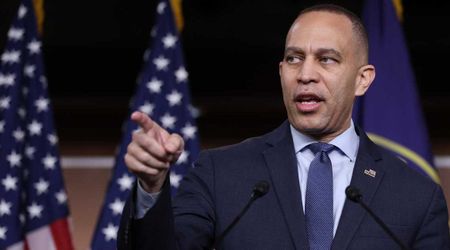Justice Elena Kagan calls out Supreme Court conservatives for 'grasping for power' in Chevron overturn dissent

WASHINGTON, DC: In a scathing dissent, Supreme Court Justice Elena Kagan accused her conservative colleagues of overstepping their bounds and neglecting the court's fundamental role within the nation's three branches of government.
She wrote that “the majority disdains restraint, and grasps for power” in the landmark decision overturning the 40-year precedent set by 1984’s Chevron v Natural Resources Defense Council.

Supreme Court abolishes 40-year Chevron precedent
The Chevron case had established that courts should generally defer to the expertise of federal agencies tasked by Congress with regulating various aspects of commerce, such as food safety and water quality. The decision recognized the specialized knowledge of these agencies, which are predominantly staffed with career officials.
However, in a case brought by two fishing companies — Loper Bright Enterprises and Relentless — the court's conservative supermajority abolished the Chevron precedent, delivering a significant victory to corporations.
“A rule of judicial humility gives way to a rule of judicial hubris,” Kagan penned in her 29-page dissent and joined by Justices Sonia Sotomayor and Ketanji Brown Jackson.
She criticized Chief Justice John Roberts and the court’s other conservative justices, who she argued now possess “the power to make all manner of scientific and technical judgments,” per Huff Post.

What did Elena Kagan say?
Kagan highlighted the potential uncertainties and disruptions caused by the majority's decision. She pointed out that the ruling “puts courts at the apex of the administrative process as to every conceivable subject — because there are always gaps and ambiguities in regulatory statutes, and often of great import.”
“What actions can be taken to address climate change or other environmental challenges? What will the Nation’s health-care system look like in the coming decades? Or the financial or transportation systems? What rules are going to constrain the development of AI?” Kagan questioned.

“In every sphere of current or future federal regulation, expect courts from now on to play a commanding role. It is a role this Court has now claimed for itself, as well as for other judges,” she alleged.
Kagan argued that the court could have continued to address federal agencies’ policy decisions on a case-by-case basis, as it had done in the past. Instead, she lamented, the majority chose to grant itself “exclusive power over every open issue — no matter how expertise-driven or policy-laden — involving the meaning of regulatory law.”
She also reprimanded the majority for frequently discarding longstanding precedents in recent years, noting that her dissents on these reversals now “fill a small volume.” Concluding her dissent, Kagan stated, “Once again, with respect, I dissent.”










